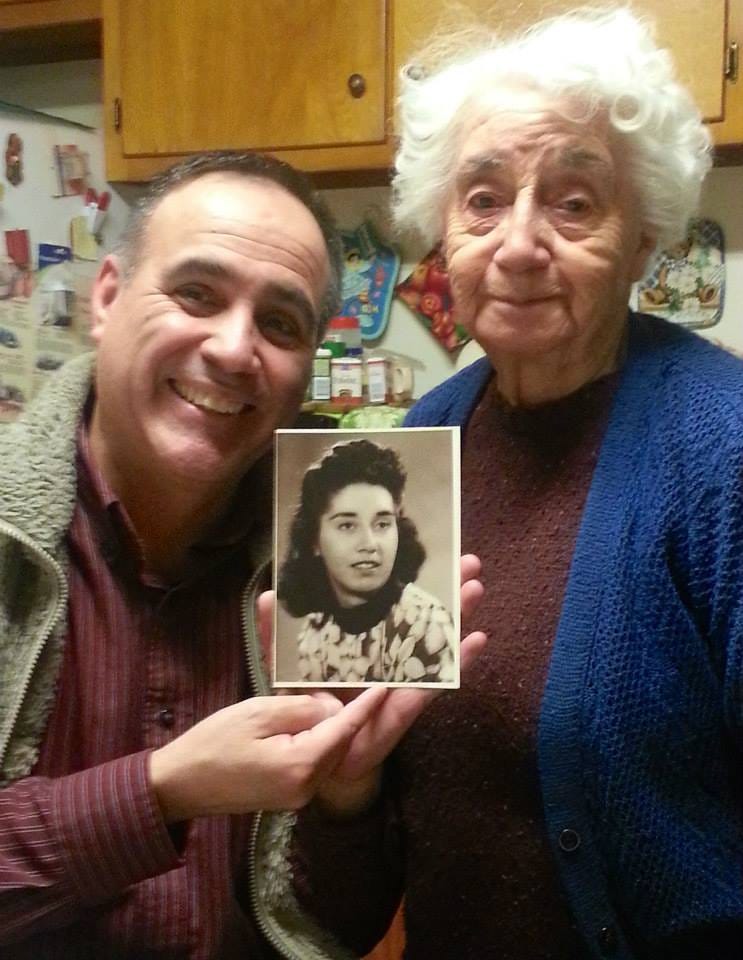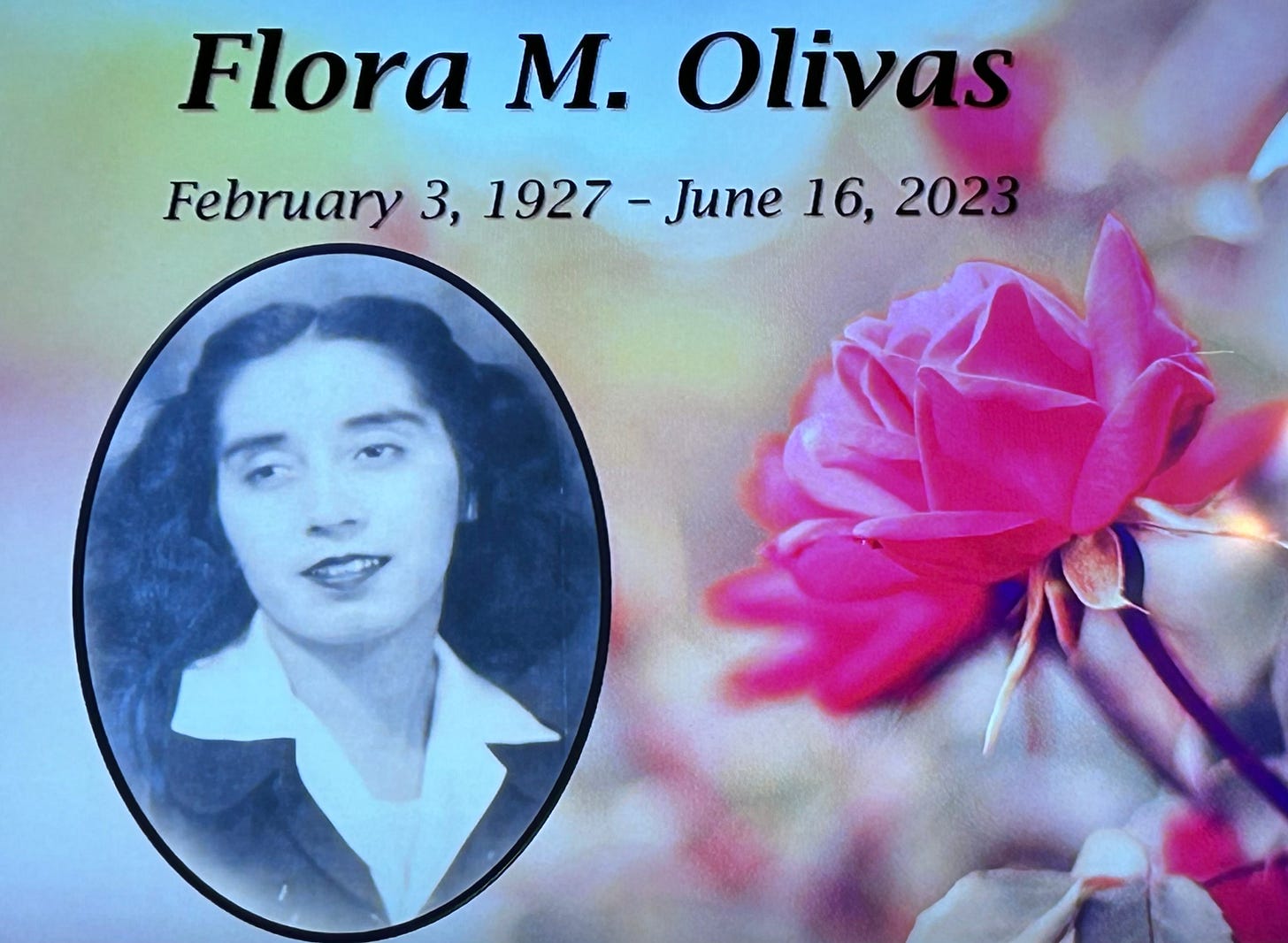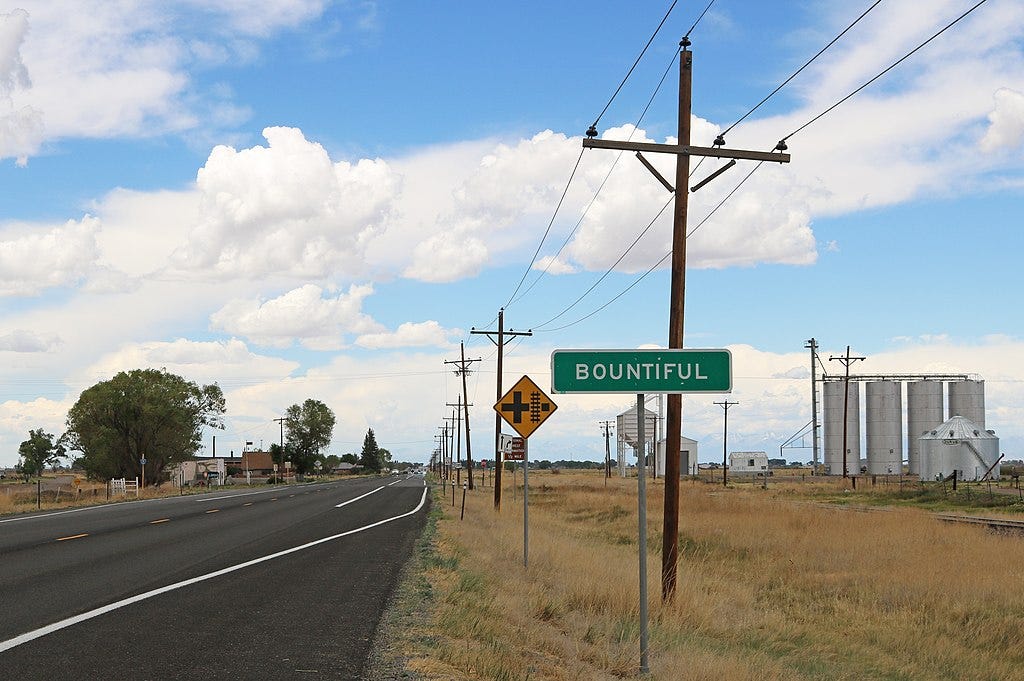How Do You Sum Up a Life?
Remembering my mother-in-law
Flora Maria Olivas had the names of both of my grandmothers. She had the Catholic devotion of Nonna (Maria, my Italian grandmother) and the devotion to feeding those she loved of Baba (Flora, my Argentine grandmother).
I knew my mother-in-law for 19 years, during which time she always treated me like the daughter she never had. Flora could be exasperating, but she loved her family unconditionally. I was included in that.
Flora’s background
Flora was born Maria Florinda Lara (I’m not sure why or when the first two names were inverted) in 1927 in Del Norte, Colorado, a town of 1,458 at the latest count, and grew up in Bountiful, an even smaller unincorporated community of just over 800 people. The alpine San Luis Valley, where Bountiful is located, is one of Colorado’s poorest rural areas; in 2019, the poverty rate was estimated at 20–25%. Bountiful’s median income is 23% lower than the national average.
Things weren’t any better when Flora was growing up; Rafael’s relatives talk about the family having been dirt poor. The Depression wouldn’t have helped, but they were accustomed to hardship. Like many who lived through those conditions, Flora “knew how to be poor,” as she told us, living frugally and saving everything. To this day, when I hold on to a rubber band instead of throwing it out, I think of her.
To contribute to the family, Flora dropped out of school in the 8th grade and went to work, doing all kinds of household labor for slightly better-off farming families. She’d live with them and help care for their children, clean, cook, do laundry — whatever was needed. It was hard work, but she remembered having kind bosses and enjoying the domestic labor.
The family had other issues to contend with besides being poor. Once, Flora and her sister Mary told us about the segregated movie theaters they’d attended growing up. There was a white section and a Mexican section, where they had to sit because they spoke Spanish (although they’d been in the region for many generations, they were indeed part native Mexican and part Spanish, with a lot of other stuff thrown in — according to Rafael’s 23andMe results). I’d never learned in school about this specific flavor of segregation, and it was a bit surreal hearing these light-skinned women with white hair talking about “white people” as the other. That’s America for you.
In the late 1950s, Flora married Lorenzo Olivas and moved with him to a house made possible by the G.I. Bill in Albuquerque, where Rafael was born. He was followed by Carlos and then Danny, who was born with Down Syndrome and had many complications related to that throughout his life.
Doctors urged Flora and Lorenzo to deposit Danny in an institution, but after a brief month-long attempt at that Flora couldn’t take it any longer and brought him home. Although caring for Danny added to Flora’s hardships, they became an inseparable unit, especially later in life after Lorenzo (who was much older than Flora) died in 2004 at the age of 92, leaving just Danny and Flora in the little house.
Her identity
Flora identified primarily as a mother, a role that to her consisted mainly of ensuring her kids were fed and physically cared for. She regretted having let Danny go for that first month based on a doctor’s word; she was fiercely determined not to ever let something like that happen again. From when she brought Danny back home, she devoted herself to caring for him.
She took him everywhere. Sometimes Flora would drive them to visit relatives in Alamosa, near where she grew up — even into her 80s, though she took it easy then. What was a four-hour drive for most people would take her three days; she had her regular motels and restaurants where they’d stop.
Because Danny needed so much extra care and stayed in the family’s home, Flora’s mothering role lasted much longer than it does for most. She had a hard time letting go of this identity when she was no longer able to care for him full-time in her late 80s. That led to a lot of tension. She often blamed Rafael for this turn of events, although it was the state that had deemed her unfit to continue caring for Danny.
She also never forgave Rafael for authorizing a pacemaker for Danny: as she saw it, God should decide when it was time for Danny to go. For years, no matter what we were talking about, Flora would work the pacemaker into the conversation so she could let us know how angry she was about it.
Her nature
I find it difficult to write about Flora. Rafael and I had our conflicts with her, and her mixture of qualities elicited mixed feelings in us. She was loving and caring; she was stubborn and tenacious. She was social and outgoing; she was private and proud. She was simple and unpretentious; she was clever and wily.
Though in some cases she was quick to speak her mind, like many women of her generation, Flora could sometimes find it hard to express her feelings and needs directly and instead engaged in a fair amount of passive-aggressive behavior. She had her own versions of “Don’t worry about me, I’ll be fine sitting alone in this dark corner.”
Still, everyone loved Flora, though many could find her irritating at times (a priest once told Rafael that she was a handful). Although she could seem stern and dour and had a tendency toward negativity, her social nature meant that she was also capable of having a good time. At her assisted living facility, she knew everyone’s names and joined in all the activities. When I looked at photos after our wedding, I was surprised to see that she’d managed to dance with nearly everyone there at some point.
Her faith
Flora lived in a different world from ours, a small world hyper-focused on religion. She couldn’t understand many of the complexities of the modern world — which admittedly can get overly complicated and burdensome — and didn’t even know how to balance a checkbook. Yet she managed to get by, and in midlife she even got her high school degree.
In the 1980s she also got a job at a food court in a local mall. The extra money she earned helped fund a few international pilgrimages with her church group to places like Lourdes.
As much as she didn’t understand our world, Rafael and I didn’t understand hers. That caused some friction. But although she knew we weren’t religious, she always prayed for us — and it’s nice to be prayed for.
I can still hear her telling us to take care of each other and that she would pray for us. If the memory of her voice fades, we have this video of her singing the Hail Mary in Spanish:
Rafael recorded this on our visit last fall, the last time that all three of us were together. I’m glad it was a good visit to remember her by: we had no conflicts, and we enjoyed some interesting talks about Flora’s past.
Her legacy
An unexpected gift of having our parents around later in life is the insights we gain about ourselves. When we’re young, we don’t see our parents as clearly as we do when we’re older. Getting to know them better over the years can shed light on our own personalities and behaviors.

I certainly understand my husband better because I got to know his mother better, and I think he’d say the same about himself. Rafael also became aware of how his brother Carlos inherited much of his attitude and style from Flora.
What we learn in this way isn’t always pleasant or what we’d want, but understanding the origins of our less desirable qualities is especially helpful; it can give us a measure of sympathy and understanding for ourselves.
Like everyone, Flora had her flaws, but she also had plenty of positive qualities that will remain with us. Her care for Danny speaks to a fundamental concern she had for life — in particular, for vulnerable life that needed help.
Though her own life was often hard, Flora lived to the age of 96 in relatively good health. Her faith carried her through the hard times and made her confident that she was going to a better place where she’d be reunited with departed loved ones. All in all, that’s not a bad way to live and die.








Such a wonderful article, Rosana. I remember meeting Flora at your wedding and having a few words with her, I think I might've even had a dance with her, I think she grabbed my butt and then told me she saw a fly parked there. I don't see my father that often but every time I see him I record him telling us stories of his life growing up in Italy during WWII, his struggles, then moving to Venezuela and meeting my mom and the struggles of racing us. I love hearing all those stories. They actually never leave us, it's been six years since my mom passed and I still feel her presence everyday.
I remember the similarities when I learned about Rafael's brother.
I find it very sad that there was so little advances in support between my uncle's birth and that of Danny. I know that my life, and that of so many others, was enriched by my uncle. I think of the sacrifices of the mothers, and also the fathers and siblings of those with handicaps.
My mom had many stories about how her parents were shunned by their siblings and parents for keeping my Uncle Bob. And giving him the traditional oldest grandson name was the last straw for many. My grandparents fought for his rights & those like him.
I still can't believe that someone with Down Syndrome was in a mainstream classroom during WWII! (It helped that there were 70+ kids in a first grade classroom, and that 70+ plus one with Down Syndrome and a free experienced teacher was an easy sell. I never heard of other parents complaining from my mom.)
Bobby was a great ambassador during his life. The only time he spent in state care was when my oldest sister was born. My grandparents didn't want to burden my parents with his care, and they were getting old. It only took a few months before they brought him home again. They kept him with them until they'd developed a branch of ARC in the neighboring city, then in their town, helped get several homes built in the neighboring city, and then placed him in the 2nd home in their town, as they entered assisted living then nursing care. He died in that home, at age 67, unheard of for those born in 1937!
That said, it's complicated. Mom became an adult much earlier - taking her first solo train trip from Chicago to Minneapolis before she was 7! Her mom was focused on Bobby's health and development, and her dad on finances. For a while, my grandparents, my great-grandfather, a great-aunt, Mom & Bobby all lived in a 2 bedroom house.
We, individually and as a society, owe a lot to those mothers who pushed the envelope!
Thank you for sharing about Maria Flora!